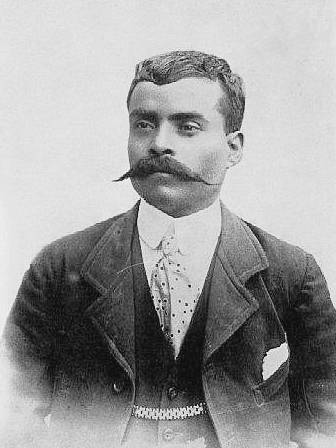
FAQ About Emiliano Zapata

Who was Emiliano Zapata?
Emiliano Zapata was a leading figure in the Mexican Revolution, known for his role in inspiring the agrarian movement. He was born on August 8, 1879, in Anenecuilco, Morelos, Mexico. As a revolutionary leader, Zapata fought for the land rights of peasants and championed the Plan of Ayala, which called for significant agrarian reform.

What was the Plan of Ayala?
The Plan of Ayala was a document drafted by Emiliano Zapata and his supporters in 1911, during the Mexican Revolution. It called for the redistribution of land to peasants and served as a critical manifesto for Zapata's movement. The plan rejected the policies of President Francisco Madero and emphasized the need for returning land to the communities that worked them.

Why is Emiliano Zapata significant in Mexican history?
Emiliano Zapata is significant in Mexican history as a symbol of resistance against oppression and as an advocate for agrarian reform. His efforts during the Mexican Revolution greatly influenced changes in land policies and inspired future generations to fight for social justice and equality. Zapata's legacy is celebrated in Mexican culture and politics, particularly among movements advocating for land and indigenous rights.

What are some common misconceptions about Emiliano Zapata?
A common misconception about Emiliano Zapata is that he was solely interested in power or leading the government. In reality, Zapata's primary concern was the betterment of peasant life through agrarian reforms. Unlike many other revolutionaries, he was more focused on social change rather than personal power. Additionally, some may mistakenly view him as a bandit, conflating him with portrayals of Mexican outlaws of the era.

How did Emiliano Zapata die?
Emiliano Zapata was assassinated on April 10, 1919. He was lured into a trap by Mexican government forces under the pretense of a meeting and was shot in Chinameca, Morelos. His death marked a significant blow to the revolutionary cause, but his ideals and struggles continued to inspire Mexican society long after his passing.

What impact did Emiliano Zapata have on the Mexican Revolution?
Emiliano Zapata's impact on the Mexican Revolution was profound due to his leadership in demanding agrarian reform and advocating for the rights of peasants. He led the Liberation Army of the South, which played a key role in challenging the federal government and raising awareness about land issues. The implementation of reforms in the post-revolution period reflects the lasting impact of Zapata's vision and actions.

What were the main goals of Emiliano Zapata's movement?
The main goals of Emiliano Zapata's movement were centered around land reform and improving the living conditions of peasants. His vision, as articulated in the Plan of Ayala, sought to redistribute land to the working peasants and return usurped lands to their original owners. Zapata aimed to empower rural communities and provide them with the resources for sustainable livelihoods.

How is Emiliano Zapata remembered today?
Emiliano Zapata is remembered today as a national hero in Mexico and a symbol of agrarian rights and social justice. His life and achievements are commemorated in various cultural and political contexts, including public statues, museums, and holidays like "Day of the Mexican Revolution," where his contributions are honored. Zapata also remains an emblem for contemporary social movements advocating for indigenous and land rights.

What was Emiliano Zapata's early life like?
Emiliano Zapata was born into a peasant family in Anenecuilco, Morelos, on August 8, 1879. His upbringing in a rural village exposed him early on to the struggles of agricultural workers. Despite formal education being limited, Zapata learned about land rights issues and became involved in local political matters, which shaped his lifelong commitment to agrarian reform.

What is the origin of the phrase “Land and Liberty”?
The phrase “Land and Liberty” is closely associated with Emiliano Zapata and the agrarian movement during the Mexican Revolution. It encapsulates Zapata's core ideals, emphasizing the need for land reform and the empowerment of peasants. This slogan became a rallying cry for Zapata's followers and represents the struggle for social justice and equitable land distribution.

How did the Mexican government respond to Emiliano Zapata's movement?
The Mexican government's response to Emiliano Zapata's movement was a mix of military confrontation and strategy. Initially, the government under various leaders, including Venustiano Carranza, sought to suppress Zapata's forces through armed conflict. Over time, the government attempted to appease peasant demands through reforms to mitigate the influence and popularity of Zapata's cause.

What was the Liberation Army of the South?
The Liberation Army of the South was the military force led by Emiliano Zapata during the Mexican Revolution. Primarily composed of rural peasants and indigenous people, this army was instrumental in enforcing the demands of the Plan of Ayala. The army sought to catalyze social change by fighting for land redistribution and supporting the needs of poor farmers.

What inspired Emiliano Zapata to become a revolutionary leader?
Emiliano Zapata was inspired to become a revolutionary leader by the injustices faced by the peasants in his community, particularly concerning land rights. Witnessing the exploitation of rural workers and loss of communal lands under the Porfirio Díaz regime, Zapata committed himself to fight for systemic change. His leadership skills and dedication to social justice naturally positioned him as a figurehead of the agrarian movement.

In what way did Emiliano Zapata influence later social movements?
Emiliano Zapata influenced later social movements by providing a powerful model of agrarian activism and resistance. His advocacy for land reform and equality laid the groundwork for numerous peasant and indigenous rights movements, both within Mexico and globally. Groups such as the Zapatista Army of National Liberation in the late 20th century drew inspiration directly from Zapata’s ideals and legacy.

Why did Emiliano Zapata oppose Francisco Madero's presidency?
Emiliano Zapata opposed Francisco Madero's presidency because he felt that Madero failed to deliver on promises of meaningful land reforms. Although Madero initially gained support by ending the Díaz dictatorship, his administration did little to address the land issues critical to Zapata and his followers. This perceived betrayal led Zapata to break ties with Madero and assert the need for more radical changes through the Plan of Ayala.

Were there any significant battles led by Emiliano Zapata?
Yes, Emiliano Zapata led several significant battles during the Mexican Revolution. Notably, his forces were instrumental in capturing the city of Cuautla in 1911, which was a strategic victory against the federal army. The Battle of Cuautla showcased his military capabilities and helped to consolidate his status as a key revolutionary leader fighting for agrarian reform.

How did Emiliano Zapata's ideology differ from other revolutionary leaders?
Emiliano Zapata's ideology was distinct from other revolutionary leaders in its staunch focus on agrarian reform and direct action for the peasant class. While leaders like Francisco Villa and Venustiano Carranza also sought political change, Zapata was unique in his unwavering emphasis on land redistribution as the cornerstone of social justice. His grassroots approach set him apart from those with broader political ambitions.

What role did Emiliano Zapata play in shaping Mexico's land policies?
Emiliano Zapata played a crucial role in shaping Mexico's land policies by highlighting the endemic problems of land inequality and championing agrarian reform. His persistent demands and military actions forced post-revolutionary governments to adopt policies addressing land ownership and redistribution. The relevance of Zapata's advocacy is reflected in various land reforms enacted in the decades following the revolution.

How is Emiliano Zapata depicted in popular culture?
Emiliano Zapata is depicted in popular culture as a symbol of resistance and fight for the oppressed. His life has been the subject of numerous films, books, and songs that portray him as a heroic and steadfast leader. Zapata's legacy is often romanticized, emphasizing his dedication to justice and equality. His image is frequently utilized by artists and activists to symbolize social struggle.

What were Emiliano Zapata's views on indigenous rights?
Emiliano Zapata was a strong advocate for indigenous rights, understanding the deep connection between indigenous communities and their ancestral lands. His calls for land redistribution included a focus on restoring land to indigenous peoples who had been disenfranchised. Zapata recognized the unique impact of agrarian reform on indigenous populations and fought for their inclusion in the larger struggle for social justice.
